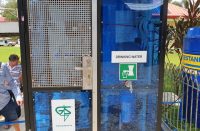The Philippine Red Cross (PRC) heightened its information drives nationwide to safeguard the community from being infected with leptospirosis and is on full standby to provide medical assistance should the number of leptospirosis cases in the National Capital Region (NCR) continues to spike.
PRC is closely coordinating with its partner hospitals in Metro Manila to augment medical provisions as the Department of Health (DOH) declared leptospirosis outbreaks in Quezon City, Taguig, Parañaque, and Pasig and reported 368 leptospirosis cases since June 10 to July 4.
“We are closely coordinating with our partner hospitals to monitor the situation in exposed areas. Our chapters nationwide are also on the ground to distribute information, education, and communication materials that contain necessary information on how to protect their families from the infection,” PRC Chairman Richard Gordon said.
The Quezon City Chapter is monitoring the volume of suspected leptospirosis cases in the National Kidney and Transplant Institute (NKTI), which alone has catered to a total of 123 leptospirosis-linked patients from June 9 to July 4. Rizal, Malabon and Caloocan Chapters strengthened its information drives after the DOH put Mandaluyong, Malabon, and Navotas under its watchlist due to the risk of increase.
PRC has mobilized its staff and volunteers in its 104 Chapters nationwide to conduct health assembly, home visitation, and health campaigns in coordination with the local municipal health office.
Filipinos are also advised to avoid swimming or wading in potentially contaminated flood water, use proper protection like boots and gloves to reduce exposure to contaminated water, drain potentially contaminated water, control rodents in household. Suspected cases shall seek treatment within two days of illness and take antibiotics prescribed by physician to avoid further complications.
Leptospirosis, a common health concern during the rainy season, is a bacterial infection transmitted by animals, such as rodents and vermin through ingesting contaminated food or water or when an open wound and mucous membrane become in contact with contaminated water or soil. Infection may result in fever, headache, muscle pain, reddish eyes, and more severe cases such as liver and kidney failure and body discoloration.
“Leptospirosis is an issue of cleanliness and personal hygiene. Flooding is apparent during the rainy season, but we can prevent leptospirosis from harming our families by being responsible,” Gordon added.
(from Philippine Red Cross)







